Learning
Learning & Teaching/Wellbeing/Faith & Farm
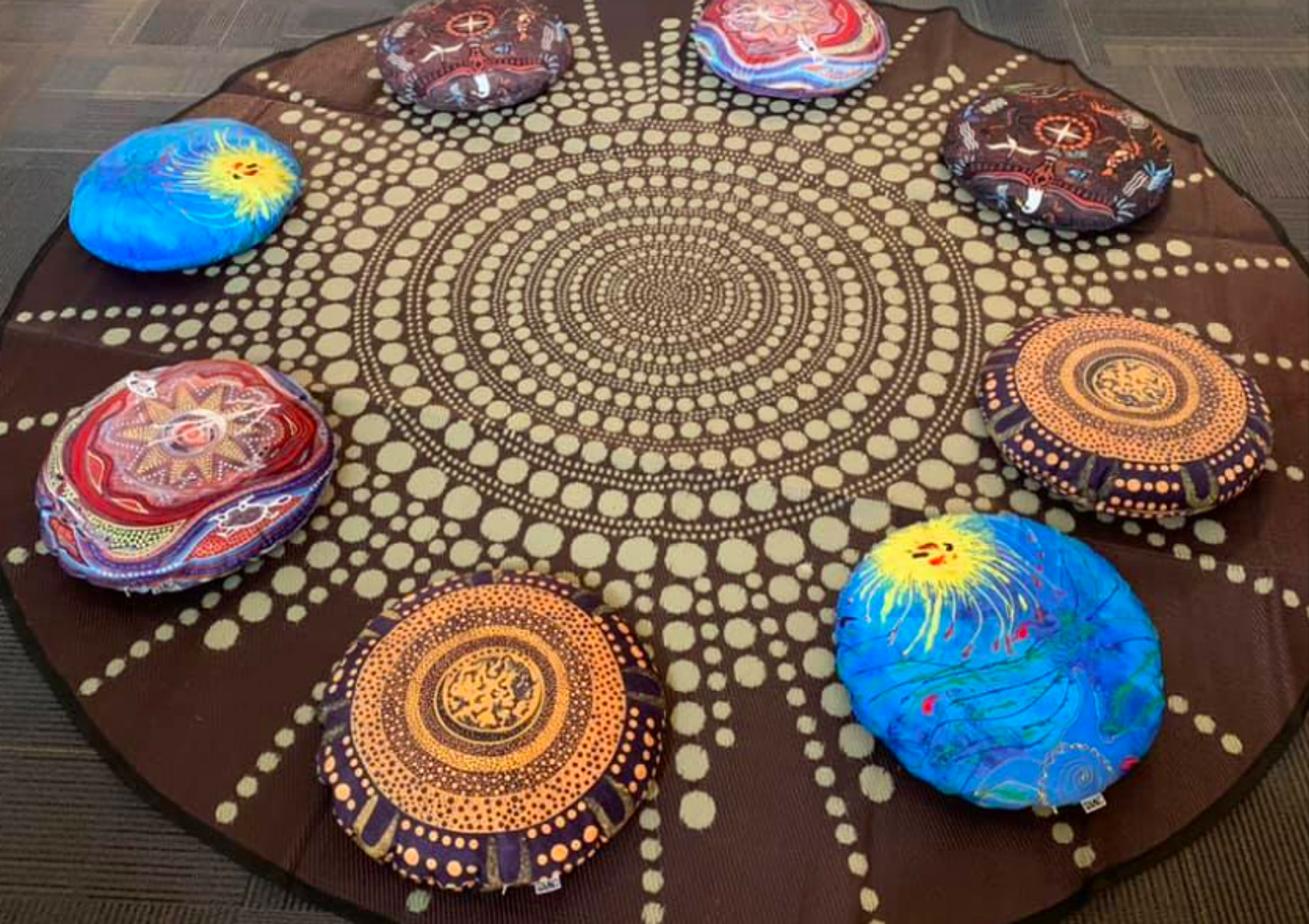
Learning
Learning & Teaching/Wellbeing/Faith & Farm
Seesaw Schedule
Hi families, Over the coming weeks, you will notice that our Seesaw Learning Posts have been created in collaboration with our children. The posts will feature a reflection of a piece of work that they believe shows their current achievement and “next steps” in their learning. As always, each post will be based on our learning progressions, which have been adapted from the Victorian F-10 Curriculum. We believe that this process will strengthen your child’s voice and agency in talking about their learning and progress. This is a trial process that we will evaluate and refine its effectiveness at the end of the year. We look forward to sharing the children’s reflections and goals for their learning! St. John’s team. |
Last week our Educators met to design learning for Literacy over the coming weeks. Here are some highlights of what Literacy learning will look like in each Hub, and how you might support your child at home:
Prep Hub
The children in our Prep Hub have been enjoying reading the books ‘Pig in the Pond’ and ‘Crocodile Beat’ as a whole class shared text. They have been learning about how they use their voice when they read; by making their voices go high / low, loud / soft, fast / slow; and how this impacts on the text.
You can support your child at home by encouraging them to change the pitch and pace of their voice when they read aloud, and asking them how this changes the text.
1 Hub
The children in our 1 Hub have been drawing on their experience of the Farm to inspire their writing. Children will be invited to engage in bookmaking and create a book connected to their experience at the farm. This could be a story about their day, or an information book about an animal or different plants that are grown at a farm.
You can support your child’s learning at home by asking them questions about their farm experience, and how they intend on using this to inspire their bookmaking.
2 Hub
The children in our 2 Hub have started exploring the text ‘The Patchwork Bike’ through as a rich literature unit. When we explore literature through this approach, we immerse children in reading through meaning making, word exploration, use of grammar, rhyme and a phonics focus. Children explore the text using the four ‘H’s’ (Hear, Hidden, Head, Heart) using questions such as:
Here (what is directly stated in the text?):
What places does the boy travel to?
What are some of the reasons the crayons aren’t happy?
Hidden (what is hidden in the text?):
How do you think the boy feels as he reads these letters? Why?
Head (thinking deeply about the text) :
Why do you think the author wrote the book in this way?
Was the author successful in achieving his purpose? How do you know?
Heart (connecting to the text)
How did you feel as you read this story? Why?
You can support your child’s learning at home by asking four H questions when engaging with a text, similar to the one’s above.
3-4 Hub
In their writing mini-lessons, children will be exploring the text ‘Cyclone’ by Jackie French through an approach called ‘Grammar in Context’. This approach, which is grounded in research by Dr Misty Adiniou, centres around children exploring rich texts through the lens of a writer, to unpack what good writers do to engage their reader through purposeful choices in grammar and vocabulary, similar to piece below from Margaret Wild’s ‘Fox’:
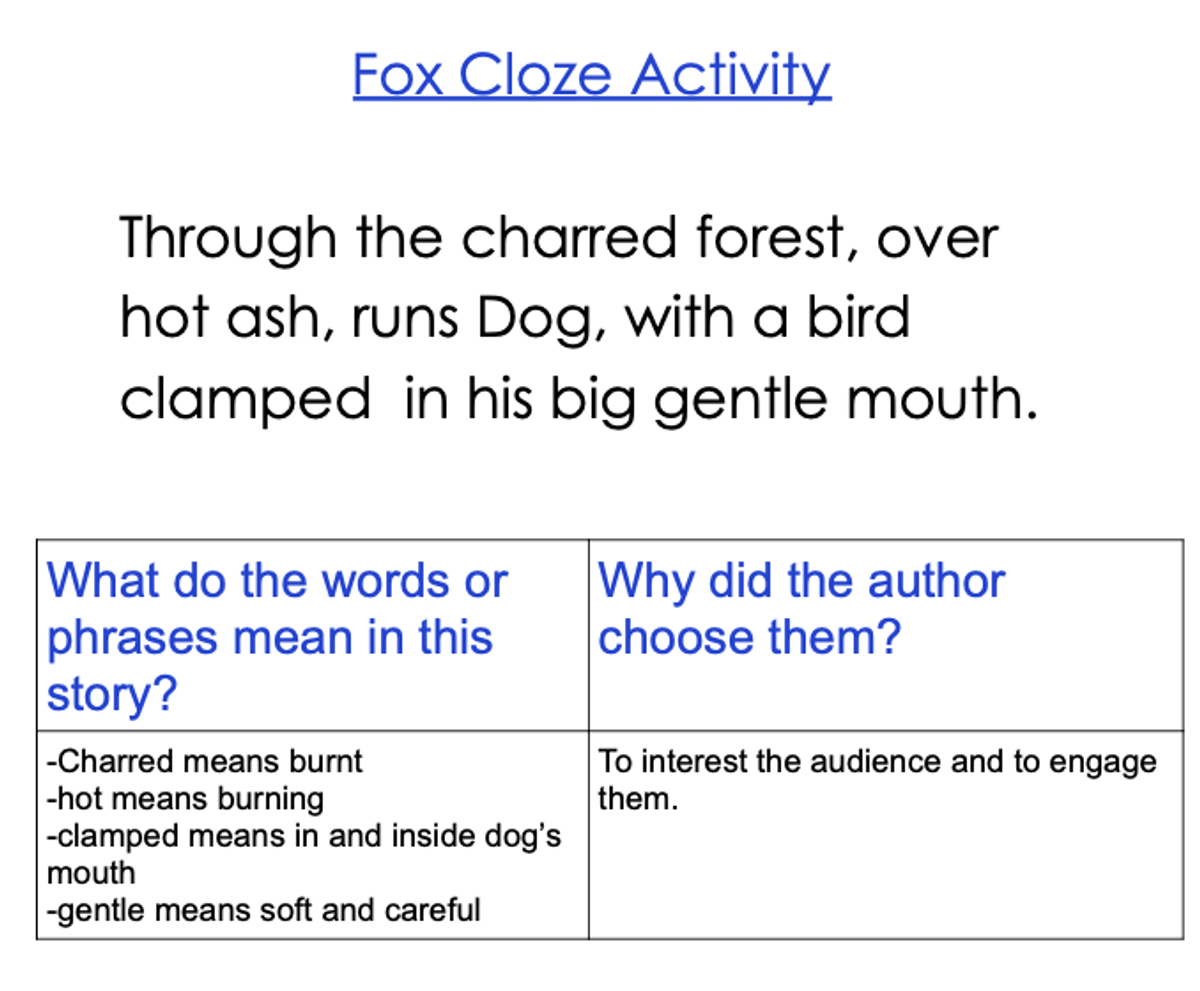

This helps children consider their word choice depending on their intended impact on the audience.
You can support your child’s learning at home by engaging in dialogue around a text they are using, and asking them to choose a phrase that they found powerful, then unpacking what the words or phrases mean in the story and why they think the author chose them.
5-6 Hub
Our children were excited to receive new Book Club books to choose from. These include books that they put forward and recommended, based on their interests. Over the coming weeks, children will form their book club groups, re-visiting their norms and ways of working.
Book clubs are a great opportunity for children to build autonomy; from selecting the text they choose to explore and delve deep into, through to the opportunities they have to partake in discussion, drive discussion and share and evoke thinking in others by the questions they ask.
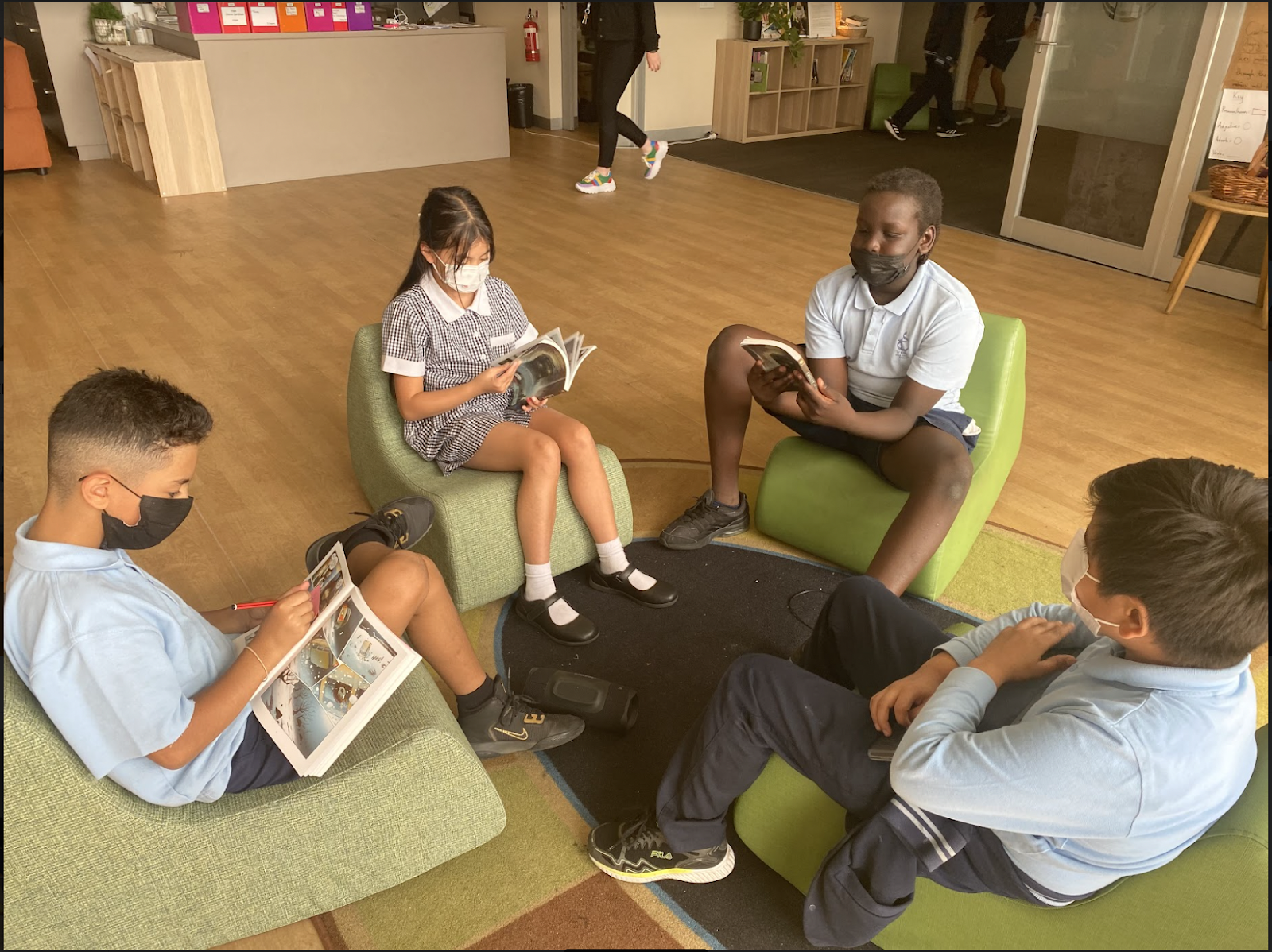

You can support your child’s learning at home by engaging in regular discussion around their chosen book clube text, asking them questions like:
If you have any further questions about how you can support your child’s reading, speaking and listening or writing at home, or any other Literacy-related questions, please do not hesitate to contact me.
Prep-2 Numeracy
This term children in our Two Hub have been working hard to learn about two-dimensional and three-dimensional shapes. They are learning the technical vocabulary that will enable them to identify, describe and explain the features of a range of common shapes. Children also need to use their critical thinking skills to sort and categorise collections of different shapes and objects.
Throughout the target sessions the educators in the Two Hub have been encouraging children to identify and describe their thinking and understanding of concepts. The educators are using the ‘Blob Tree’ to assist children with identifying the stage of learning or understanding they are currently sitting at. The tree represents the learning that is taking place and each of the blobs represent a different emotion. Children are asked to identify which blob they are and why, then reflect on which they would like to be and how they are going to get there. The educators have found this a very useful tool in supporting children to talk about their learning.
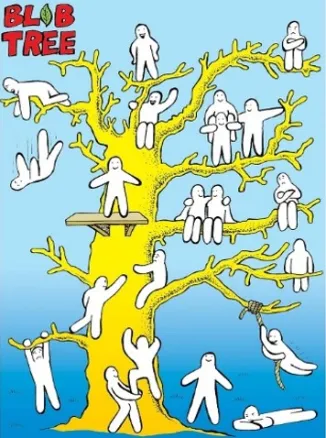

3-6 Numeracy
“Students who can think mathematically, analyse problem meanings and explore means to a solution, as well as carry out a plan to solve mathematical problems, acquire deeper and more useful knowledge than simply being able to complete calculations… it is critical that mathematics teaching focuses on enabling all students to readily engage with and explore mathematical problems and investigate tasks”” - Booker, Bond, Sparrow & Swan (2014)
This term, both the three/fours and the five/sixes will be engaging in processes for solving word problems. The following ‘I can’ statements have been taken from the three/four metacognition capability (development of thinking processes).
3/4s: I can select from an increased range of strategies to solve learning problems
Through multiplication, the three/fours will be exploring mental and written strategies for solving problems, with investigating the concept of multiplication first, then moving towards ‘algorithmic thinking’ (engaging in a step by step process for problem solving).
Learning question: What’s actually happening when numbers are multiplied together?
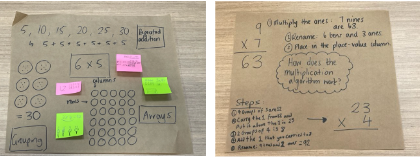

These images show the progression children engage in when exploring multiplication.
Next steps for the three/fours, will be around applying these strategies to worded problems. This’ll be a focus for the term, as they then move into exploring the concepts of area and volume, then division.
Next newsletter, we’ll unpack how the five/sixes have engaged in processes of problem solving, as they too enter into units around multiplication and algebraic thinking.
Mitch Hayes
3-6 Numeracy
mitch.hayes@sjfootscray.catholic.edu.au
Supporting Student Wellbeing
In week 3, students in Grades 2-6 will be completing a Student Social Emotional Wellbeing Survey (PAT SEW) to gather data on Wellbeing measures for our students. Educators of children in Grades Prep and One will complete the Teacher Survey for these students. The purpose of the survey is to identify areas of student need at St. John’s and provide data that will inform Wellbeing program development including Ready to Learn and the work already taking place in the hubs using the Berry Street Education Model. We also believe that the data, once gathered and analysed, will inform opportunities for future Wellbeing Initiatives and programs at St. John’s School.
Year 7 2024 Secondary School Transition
A reminder for all families of children currently in Grade 5 that applications for enrolment into Catholic Secondary Colleges for 2024 close on 19th of August 2022. Please submit your applications directly to the colleges of your choice. Please ensure that an application is submitted even if your child has an older sibling attending the same college.
Wellbeing Resources to support families.
There are some useful websites from reputable organisations that support families and the wellbeing of parents & carers, children and young people. There is a wide range of topics on the Raising Children Website which is a parenting website supported by the Australian Government - Department of Social Services, The Parenting Research Centre, The Royal Children's Hospital Melbourne and the Murdoch Children’s Research Institute. Topics include: Parents Mental Health & Wellbeing, Bullying and School Problems, Depression, Anxiety & Stress, Eating Disorders & Body Image, Autism, Disability & Chronic Illness, ADHD, OCD & ODD, Abuse, Violence, Trauma & Grief, Sleep and many more.
The website can be found at https://raisingchildren.net.au/for-professionals/mental-health-resources


Karen Dodemaide
Co-Deputy Principal and Wellbeing Leader
kdodemaide@sjfootscray.catholic.edu.au
Ashlee Owen
Learning Diversity Leader
aowen@sjfootscray.catholic.edu.au


“As Our World Turns”
Our Hubs have begun their exploration into design and technology through our new Community Project, ‘As Our World Turns.’ The children will investigate the needs of their current community, and the potential challenges that their future communities may face. They will learn about, and will apply dispositions like collaboration, imagination, creativity and adaptability while designing and creating new solutions to problems they encounter.
Our children in the Prep Hub will begin exploring our local context of our St John’s Farm, and will learn about its various needs. They will investigate how current tools and technologies are used to care for the land, and how these tools have been developed over time. They will also be invited to consider how the farm’s needs may change over time and how, as designers and makers of the future, they will respond to these needs.
Our children in One Hub embarked on their first encounter to the Collingwood Children’s Farm, where they explored the different resources that the land offered. They will continue to explore how we, as humans, have interacted with the land and have used its resources to impact design solutions for different problems that we have encountered.
Our children in the Two Hub will explore what the future could look like, and how the needs of the community may change and how design and technology will pivot to meet these needs. They will draw inspiration from past communities, like our Indigenous people to learn about how their communities have adapted and survived the changing conditions of the world over time.
Our children across Years Three to Six have begun exploring the Design Process, and the steps involved in creating products that meet the needs of communities. They have started exploring how problems have impacted different members of the community and possible solutions that technology can offer. They will continue to identify the ethical considerations raised by these designs and how these considerations can be mediated by the potential pay-offs and positive impacts of their development.


“There is neither Jew nor Greek, there is neither slave nor free, there is no male and female, for you are all one in Christ Jesus.” Galatians 3:28
This verse from the Epistle of the Galatians reminds us that we are all one within our faith community, no matter how ever changing and growing we are. This term, we will be exploring Saint Mary Mackillop, her advocacy for the marginalised and poor, and how we gather together in support for those who need our help the most. After all, as Saint Mary Mackillop said, “we are all but travellers here”.
Faith encounters so far this term:
The prep to two hubs have begun exploring the Catholic Social Teaching of ‘preferential option for the poor’. Guided by scripture, Saint Mary Mackillop and contemporary examples of compassion and generosity, the Prep-2 Hubs will explore how giving to those who need it most is an integral part of being a member of the Catholic community, and how this is mirrored in other religious and cultural communities.
Some snapshots across the school:
Prep Hub wonderings when being shown a cartoon image:
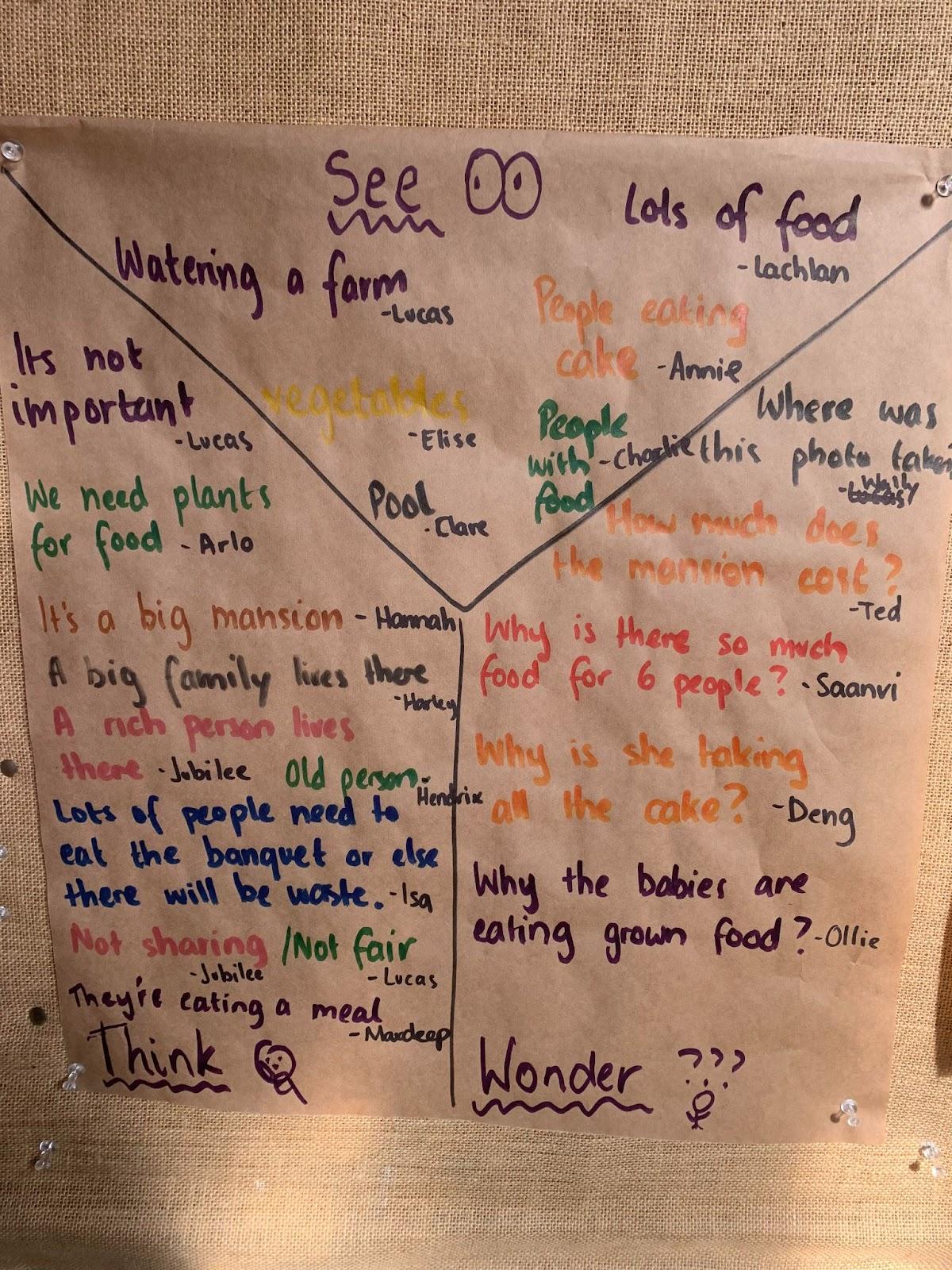



One hub:
The one Hub have been reading Matthew 14:13-21 ‘Jesus Feeds the 5,000’:
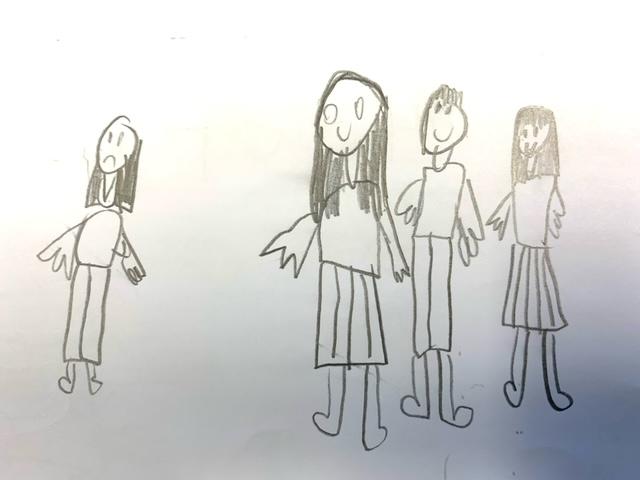

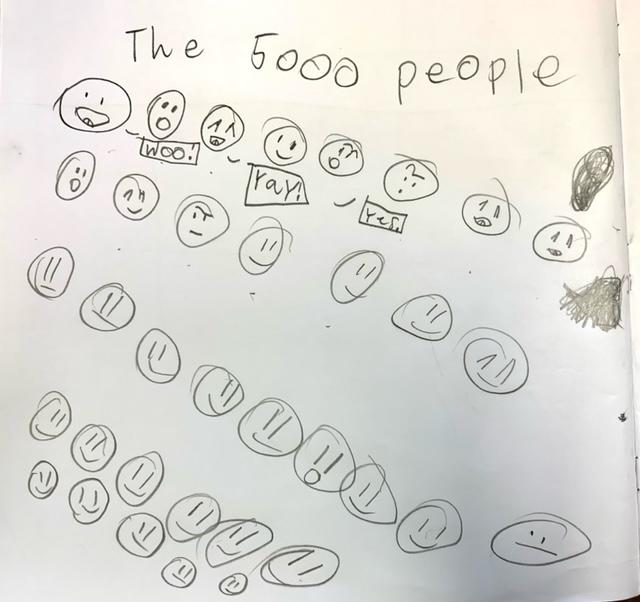

The three/four Hub have begun unpacking ‘celebrations’ in preparation for the Sacrament of Eucharist later this term. Here are some of their ‘first ideas’ around the concept of celebration:
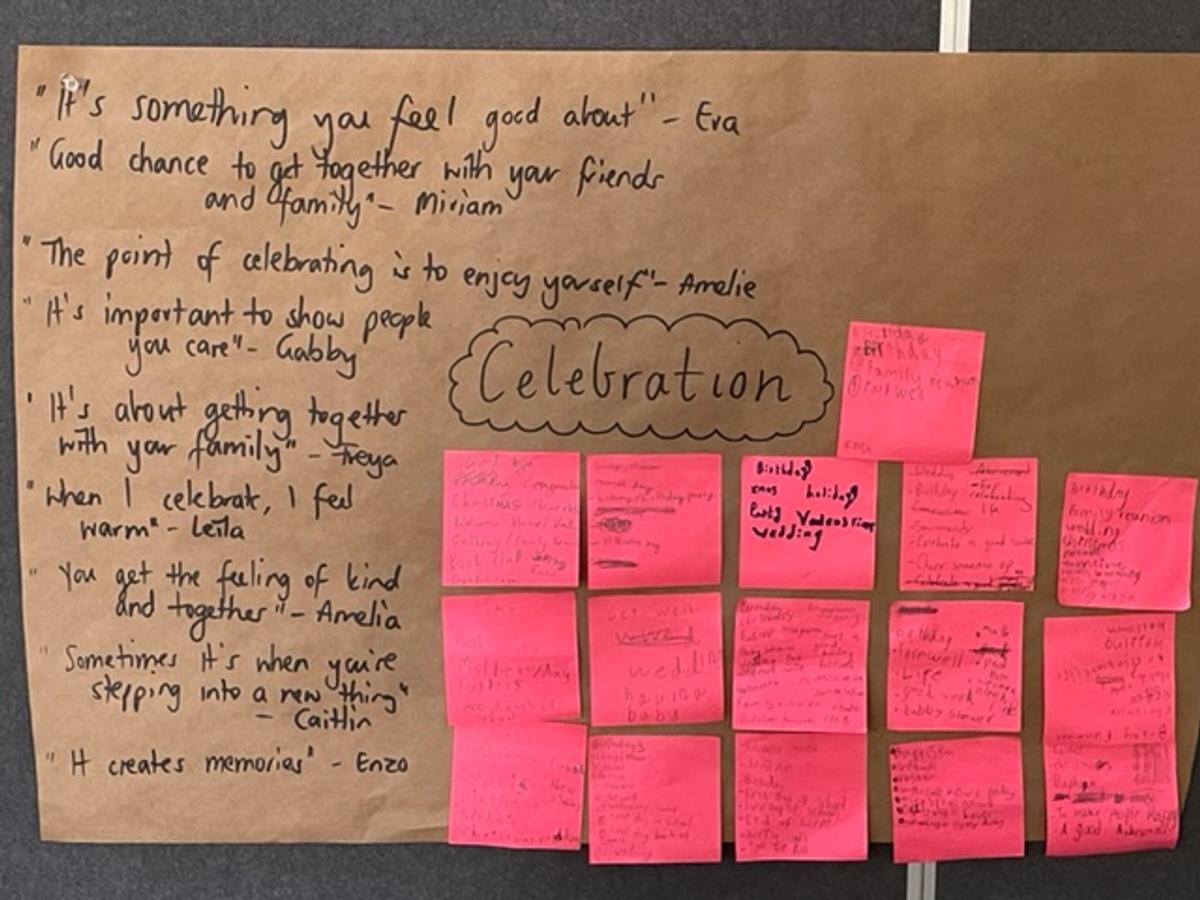

Mary MacKillop Feast Day
“Never see a need without doing something about it” - Mary MacKillop
On Monday the 8th of August, St John’s will be celebrating the feast of Mary MacKillop, an annual recognition of Mary’s canonisation as Australia’s first Catholic Saint. A Mass at Our Lady’s in Maidstone will be celebrated from 10:00am - 11:00am, with families more than welcome to attend.
There will also be a special ‘shared lunch’ from 1:30pm, more information to follow as the date nears.
Sacrament of Eucharist
Our grade three/four children making their first communion this term, will be celebrating the Sacrament of Eucharist on Sunday the 11th of September at 10:00am, at Our Lady’s Church in Maidstone.
Asylum Seeker Resource Centre food drive
Springboarding from our Term 3 focus on ‘preferential option for the poor’ as well being inspired by the advocacy of Saint Mary MacKillop, St John’s are excited to participate in a food collection for Footscray’s very own Asylum Seeker Resource Centre. Information related to the food drive will go home with each child Friday afternoon, and will commence from Monday 25th of July.
Mitch Hayes
(Faith/REL Leader)
mitch.hayes@sjfootscray.catholic.edu.au
Mixed Netball
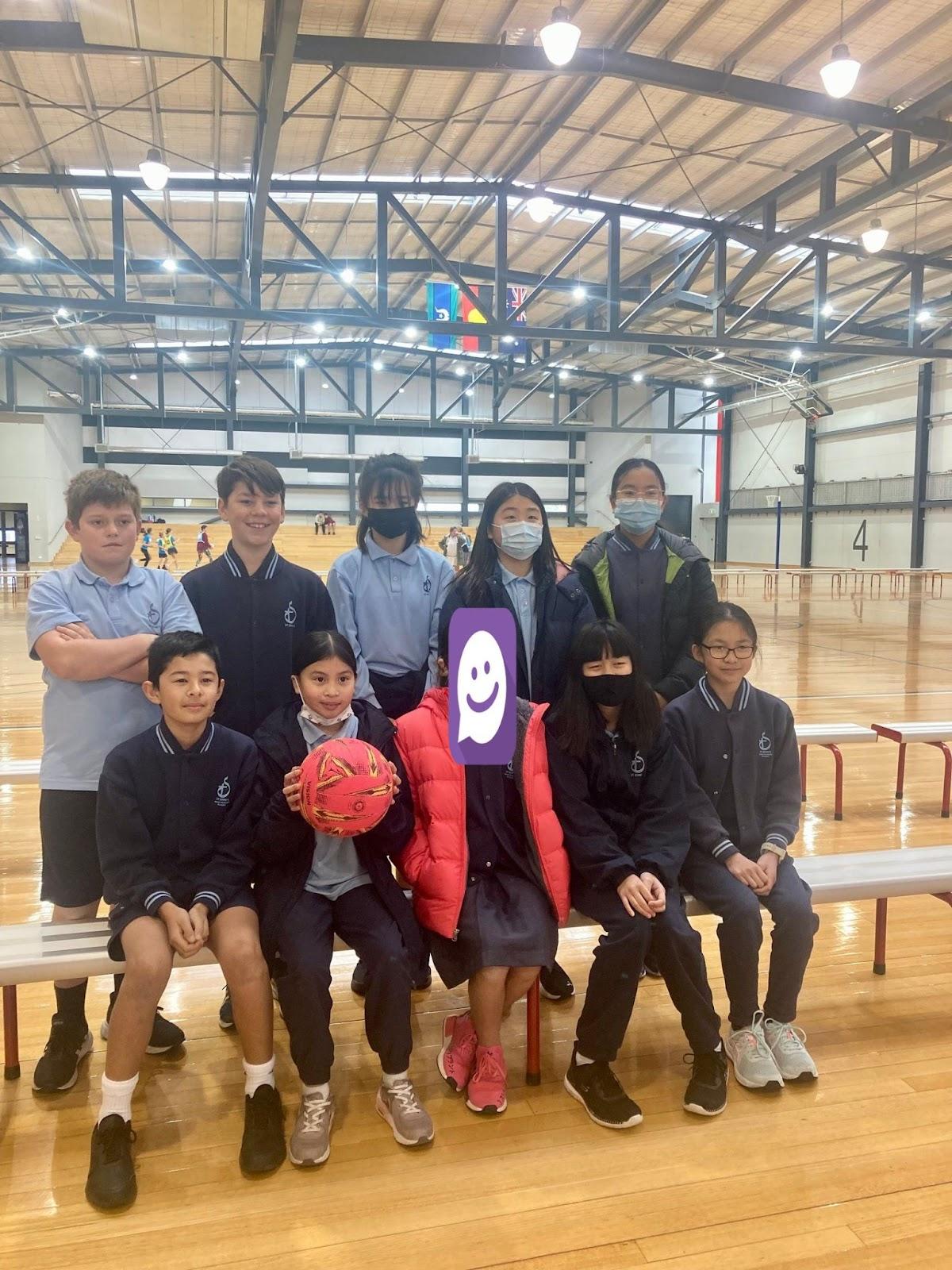

Congratulations to our Mixed Netball Team who competed in the division sports finals round robin event at Keilor stadium last Friday. The team played extremely well and should be proud of their efforts. They demonstrated amazing sportsmanship and teamwork. Well done Evan, Angus, Isabella, Zoe, Bella, Vivian, Noah, Vanessa, Ansley and Erin! We are very impressed with your efforts.
Virtual Visit from the Western Bulldogs!
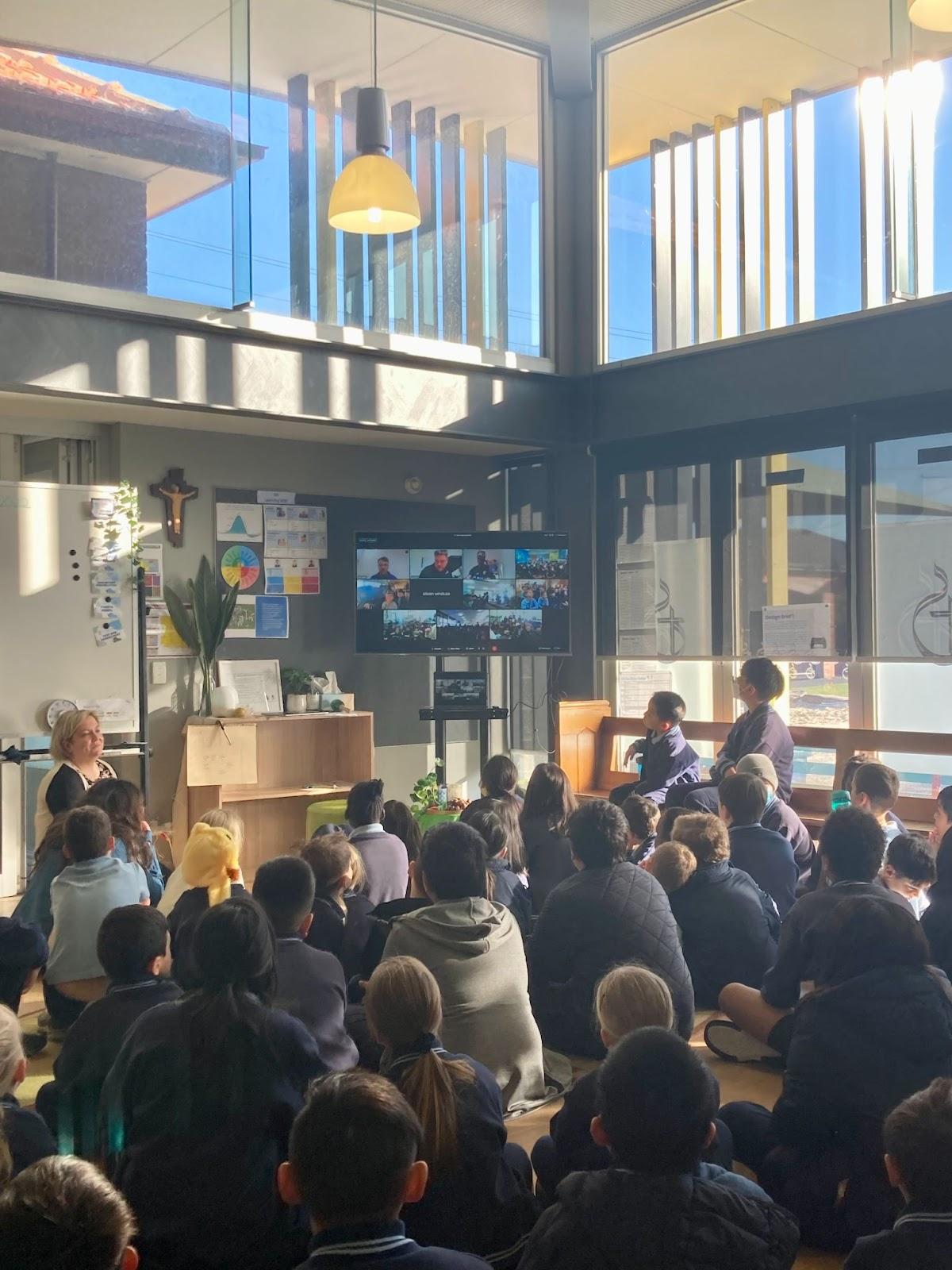

On Tuesday we had a special meeting with players from the Western Bulldogs Football club! The club held a virtual visit for schools in the inner west and south west. We met Anthony Scott, Bailey Smith, and Jack Macrae. The students from each hub were very happy to participate, asking questions and learning from the players. This was a great opportunity.
AFL in schools
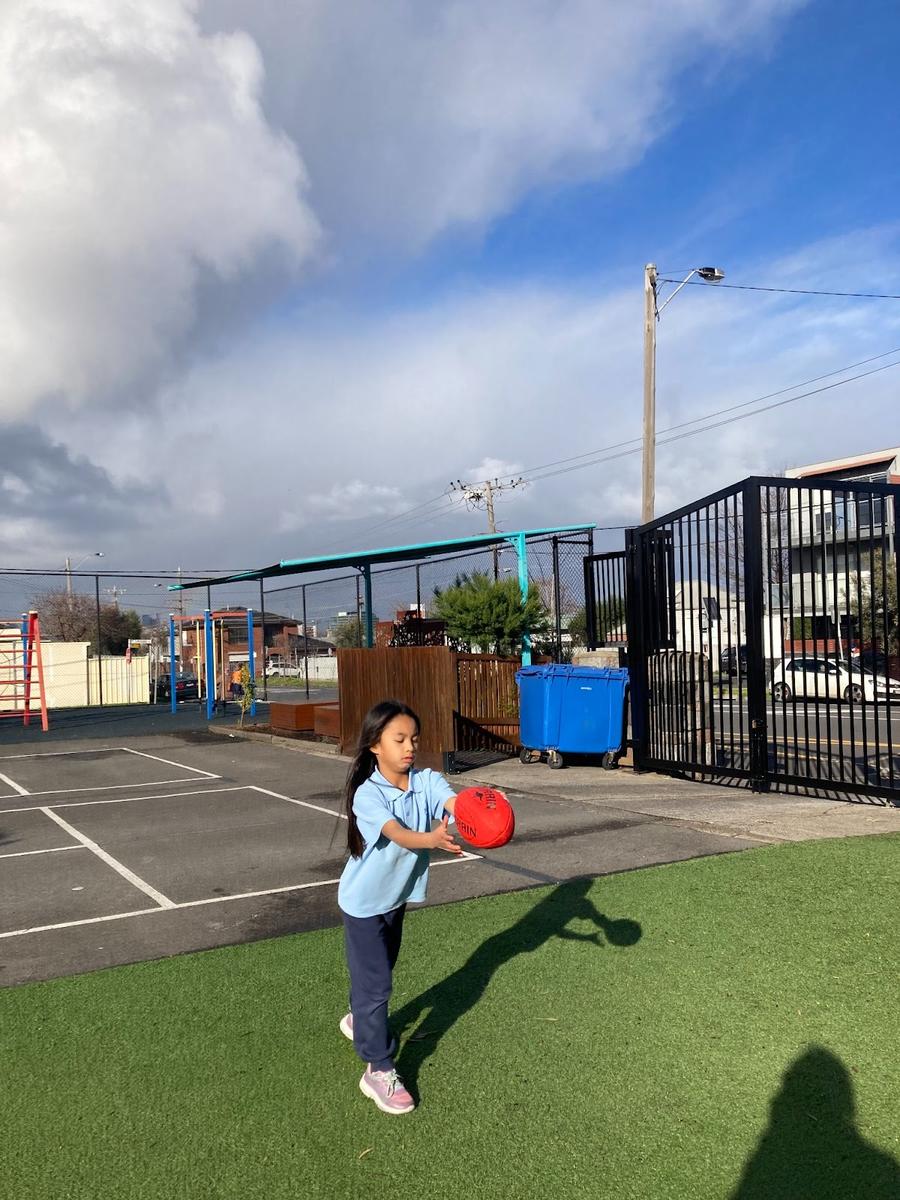

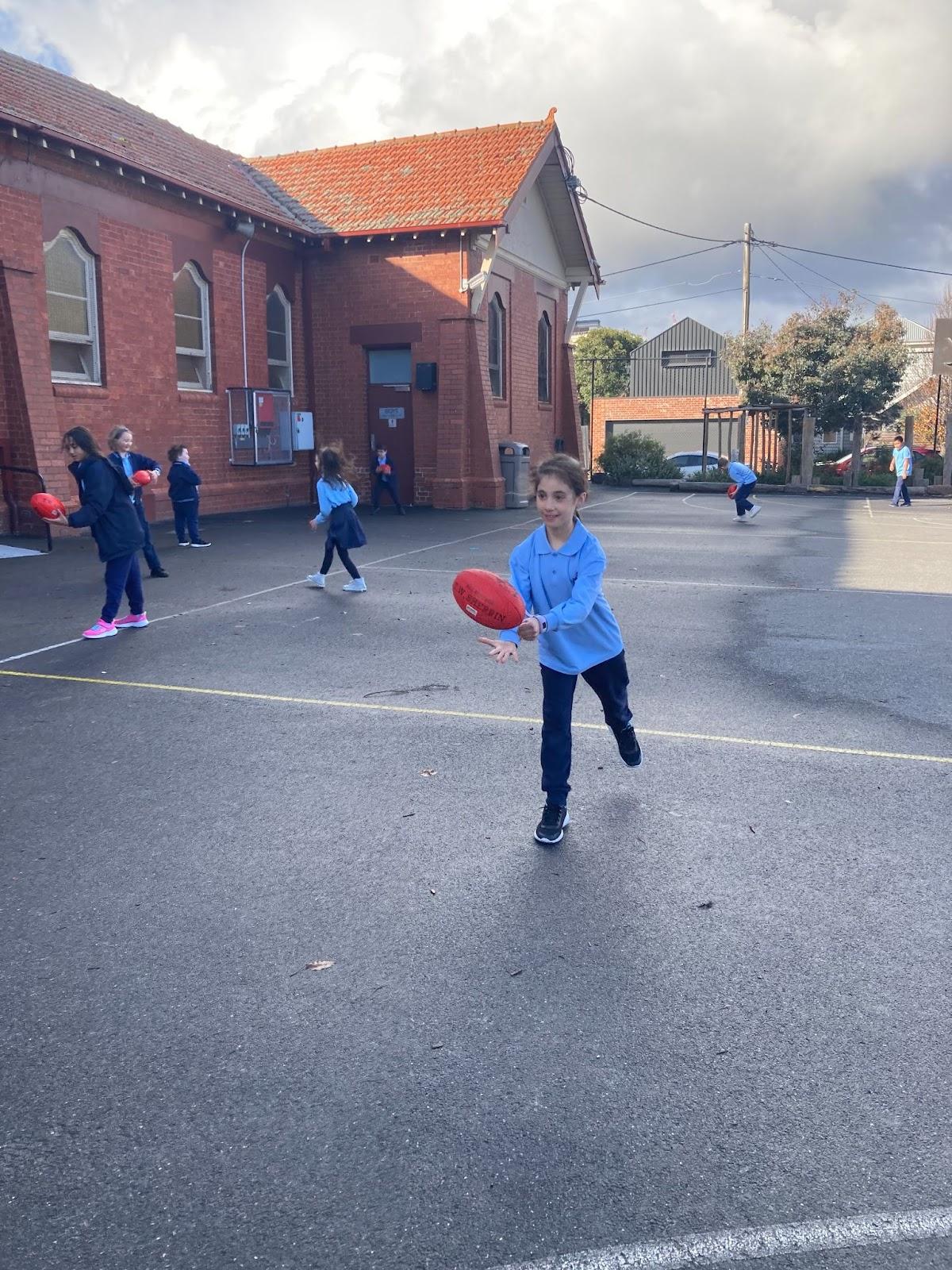

For the beginning of Term 3 our senior students (Hubs 3/ 4, and 5 / 6) will be working with Coach Maddison, a trained AFL coach from AFL Victoria in schools. These lessons are curriculum linked and industry designed for primary school students. The students will further develop their knowledge and skill set in the sport of AFL.
AFL Victoria’s schools vision is to deliver AFL in every school across Victoria and aims for students to build a life-long connection to the sport. This is a fantastic opportunity for our students.
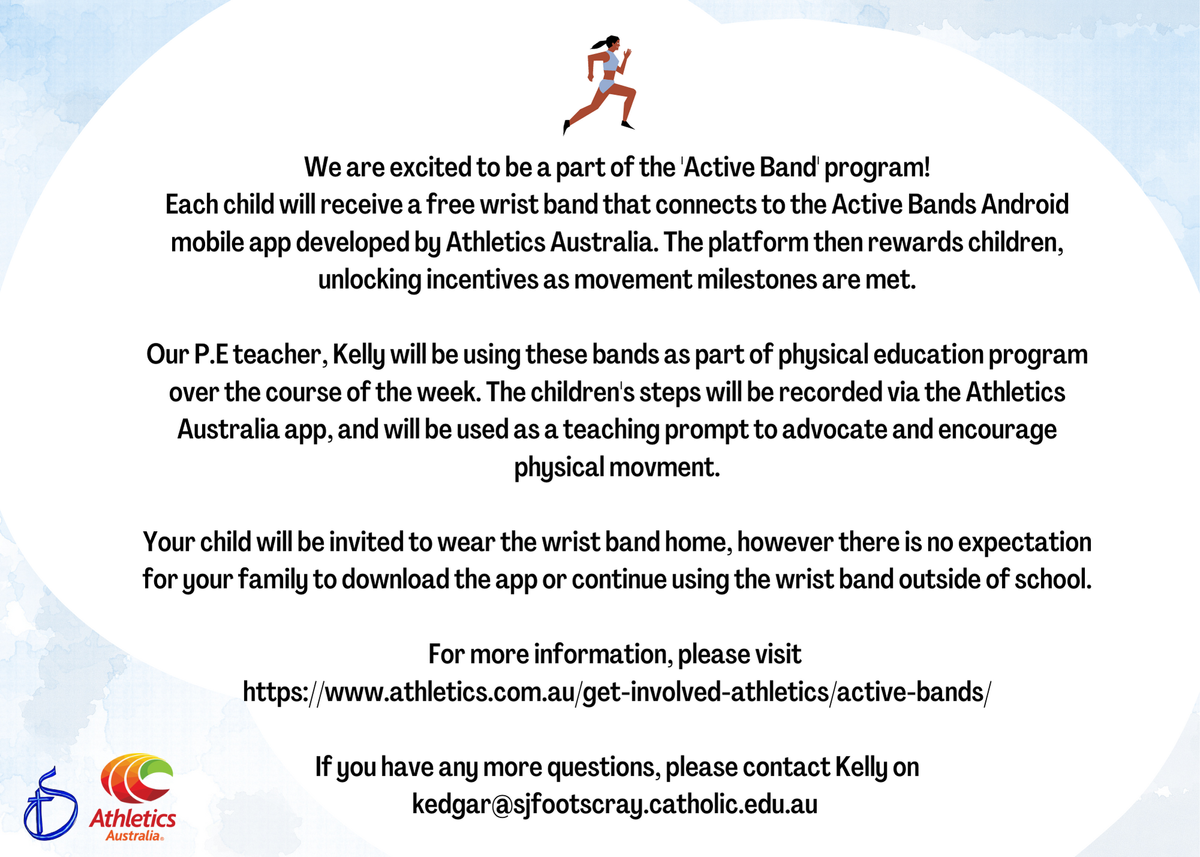

Kelly Edgar
Physical Education